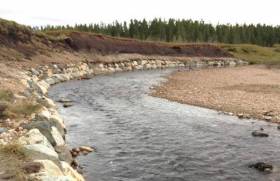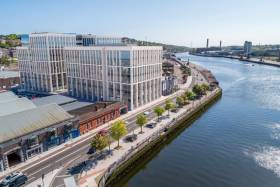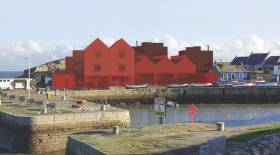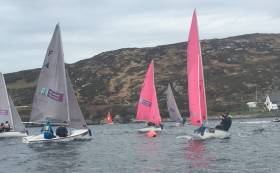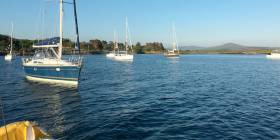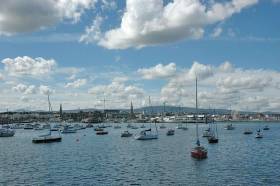Displaying items by tag: development
Inland Fisheries Ireland Launches 2019 Funding Call For Conservation & Development Projects
Inland Fisheries Ireland has announced a new funding call for 2019 with three funding schemes now open to angling clubs and community groups.
The funding has been made available for fisheries conservation projects and development projects nationwide through the National Strategy for Angling Development (NSAD).
Applications are invited from angling clubs, local development associations, tidy towns and others who may be looking to carry out projects.
The 2019 funding call consists of three schemes.
The NSAD Capital Grants Scheme 2019 (€136,000) is aimed specifically at capital improvement works with grants available to groups and individuals looking to improve angling access and infrastructure in their locality.
The Salmon and Sea Trout Rehabilitation, Conservation and Protection Fund focuses on the protection of both salmon and sea trout. It will fund rehabilitation, protection and conservation projects, all of which must focus on salmon or sea trout. This fund replaces the Salmon Conservation Fund and extends it to include both salmon and sea trout with project values starting from €2,000 for awareness projects. The upper limit of €15,000 has been removed.
The Midlands Fisheries Fund (€50,000) will focus on conservation and rehabilitation projects in the midland fisheries permit area. The fund has been created through contributions from the permit income received via the Midlands Fisheries Group permit area.
Sean Canney, Minister of State with responsibility for the inland fisheries sector, said: “Since the inception of the National Strategy for Angling Development, we have invested €3.4 million in fisheries development, protection and conservation projects across the country.
“Progress is being made in the delivery of projects which support vital fisheries conservation and rehabilitation and which enhance Ireland’s angling offering. The fisheries resource should be enjoyed by all and this funding call today once more will help bring angling to the broader community in a conservation focused manner.”
Suzanne Campion of IFI said it looks forward to working with community groups from application to delivery stage on their projects.
“We are already partnering with over a hundred clubs and associations in the delivery of fisheries projects. The commitment of these groups in making a valuable difference to their locality is inspiring.”
For more information about the 2019 funding call, to download an information booklet and to submit an Expression of Interest, visit www.fisheriesireland.ie/funding.
All applicants must apply through the Expression of Interest, which opens today (Tuesday 16 April), to progress to full application. Full applications may be submitted from Monday 20 May with the closing date for applications on Thursday 20 June.
IFI will be hosting information workshops over the coming weeks for those looking for further information or support with the application process:
- Dublin — Citywest Hotel — Monday 29 April
- Cavan — Cavan Crystal Hotel — Tuesday 30 April
- Donegal — Harvey’s Point — Wednesday 1 May
- Ballina — The Great National Hotel — Thursday 2 May
- Galway — Maldron Hotel, Oranmore — Friday 3 May
- Limerick — Maldron Hotel — Tuesday 7 May
- Tralee — Ballygarry Hotel — Wednesday 8 May
- Cork City — Rochestown Park Hotel — Thursday 9 May
- Kilkenny — Ormonde Hotel — Friday 10 May
Cork City’s Penrose Dock In Line For €125m Redevelopment
#CorkHarbour - The Evening Echo reports that Penrose Dock is the latest office development project to be greenlit for Cork’s city centre docklands.
Located adjacent to the Horgan’s Quay project launched a year ago, the proposal by John Cleary Developments will see 250,000 sqft of office space on a nearly two-acre site on Penrose Quay — where a ‘tall ship hotel’ could be moored later this year.
A ‘townhall space’ plus a café and underground parking are included in the Penrose Dock plans, which also seek to retain the historic Penrose House building on the quayside.
The announcement comes shortly after Property Week highlighted Cork — and Dublin — as an as-yet-untapped opportunity for waterfront regeneration.
“Cork’s docklands have been described as the last great undeveloped urban landbank in Ireland,” writes Richard Hook in his analysis of a growing list of redevelopment plans in the city and wider Cork Harbour area.
#DublinBay - New plans to redevelop Bulloch Harbour, Dalkey in south Dublin writes The Irish Times has been dismissed by local opponents as “in some respects worse” than an original design rejected by planners a year ago.
A public meeting took place on Tuesday night aimed at rallying opposition to the development (see previous report) which Bartra Capital Property Group is behind.
The company, founded by developer Richard Barrett, has revised its earlier plan and hopes to secure permission from Dún Laoghaire-Rathdown County Council for a scheme that would include two apartments and three large houses. It would also provide a building workshop for “traditional timber boats”, a public square, a cafe, community changing facilities and new units for existing businesses, including boat rentals.
Despite the developer’s insistence it addressed issues arising from its previous application, opponents say they remain concerned about potential flooding, wave over-topping and a scale of build considered “a gross intrusion” to the existing area.
“Unfortunately, this new application is in some respects worse than the one refused by the council,” said the Bulloch Harbour Preservation Association (BHPA) which organised the meeting, attended by about 250 people.
Its members believe the new application “pays virtually no attention to the special character, heritage and history of this small working harbour”.
To read further on the history and heritage of the small south Dublin Bay harbour, click here.
Plans Lodged In Cork For Horgan’s Quay Transformation
#Property - Horgan’s Quay in Cork is set for a transformation with new offices, apartments, a hotel and an open plaza beside the River Lee.
Plans were first mooted a year ago for development of the CIÉ lands in the heart of Cork city, as previously reported on Afloat.ie.
But the Irish Examiner confirms that planning permission was finally lodged this past week for the €160 million ‘HQ’ development over six acres adjacent to Kent Station.
The scheme will have 160 metres of frontage on Horgan’s Quay, opposite the Port of Cork site on Custom House Quay for which buyers were being sought earlier this year.
The Irish Examiner has more on the story HERE.
ISA Predicts Team Racing Is Set To ‘Go Viral’
#TeamRacing - Last weekend’s Student Yachting Worlds selection in Howth shows the health of team racing among the collegiate set, especially among those sailing for fun.
But team racing as a discipline is more than just an opportunity for lapsed or lower-skilled sailors to get their jollies on the water — it’s an untapped pool of potential club members with the itch to sail on a regular basis.
Indeed, the Irish Sailing Association says team racing “is an excellent format to promote more sailing” and notes that more and more clubs are procuring boats for precisely this purpose.
The short racing format and potential for regular intra- and inter-club meets also cultivates the elusive ‘fun factor’ that could keep younger sailors as active club members for years to come.
To this end, the ISA is holding a team racing development meeting at the National Yacht Club in Dun Laoghaire from 7pm on Wednesday 24 May to discuss the potential of building team racing within Ireland’s sailing clubs and help the concept ‘go viral’.
Interested clubs should contact [email protected] by Friday 12 May.
Schull Marina Project Closer To Fruition As Funding Sources Targeted
#IrishMarinas - A long-awaited marina development in Schull Harbour may finally get under way if funding from three possible sources can be secured, according to the Southern Star.
Fáilte Ireland, the Coastal Infrastructure Capital Programme and EU funds have been identified as target sources to make up the majority of the €6 million budget for the project, which includes a new slipway and public promenade, that was first greenlit by planners a decade ago.
Cork County Council also told councillors at a recent meeting that €375,000 will be allocated to match €1.125m in public funding for necessary pier works.
Planning permission for the 200-plus-berth marina was due to run out this year, as previously reported on Afloat.ie, but it has now been extended till 2022 — though a foreshore lease must come before any work can begin.
The Southern Star has more on the story HERE.
#DunLaoghaire - Close to 100 people attended a meeting last night (Thursday 27 October) in the Royal Marine Hotel organised by the Save Our Seafront (SOS) community group, writes our special correspondent.
SOS campaigns for the public interest in the foreshore of Dun Laoghaire and against what they believe to be the inappropriate developments proposed by the authorities with responsibility for the coastal aspects of the harbour and the borough.
An imminent decision by An Bord Pleanala on the Dun Laoghaire Harbour Company’s (DLHC) application to develop a major cruise liner terminal in the harbour was a significant factor in the discussion.
But the general sentiment was that no matter what the outcome, DLHC’s finances are widely believed to be in such a position that development would not be possible.
The alleged lack of fiscal responsibility by the DHLC was referred to repeatedly by the top table and from the floor.
Dun Laoghaire-Rathdown councillors were not spared criticism, either, as several participants noted Cllr Melisa Halpin was the only one of the 40 elected representatives in attendance.
The recent pronouncement in the Senate by Transport Minister Shane Ross that a transfer of the responsibilities of DLHC was imminent was linked by Richard Boyd Barrett TD to the delay in the planning decision, when he said: “After five years in the Dáil, I don't believe in coincidences anymore.”
The meeting encouraged participants to lobby their councillors to vote for a complete takeover of the DLHC by the council, rather than the ‘quango’ option whereby the DLHC would remain as an entity within the council structure.
All types of harbour users were present at the meeting, many of whom were sailors.
Speakers concurred that the future of the harbour lay in water sports and in the wider maritime heritage sector, partially supported by smaller commercial activity than that envisaged by the DLHC.
Work Begins On New Homes At Greystones Marina Development
#Greystones - Following moves to complete clubhouses for Greystones Harbour users comes news that work is resuming on the delayed residential part of the €300 million marina development.
According to The Irish Times, the first of an expected 350-plus new homes will be offered for sale by April 2016 after new builders Bridgedale Homes were appointed to the waterfront development to complete the housing and landscaping aspects.
Commercial units will follow later in the new year – and in the meantime, the five clubs awaiting their new facilities have been handed €1 million for fitting out the buildings in time for spring.
The Irish Times has more on the story HERE.
Greystones Club Houses Nearing Completion
#Greystones - Moves are being made to complete developments for five clubs in Greystones Harbour before year's end, as the Wicklow Times reports.
Developer Bridgedale JV recently informed Greystones Municipal District councillors that the €3.5 million facilities are nearing completion after ground was broken in January this year.
The news was welcomed by Cllr Derek Mitchell, who expected the new public square to be completed in June 2016, with a public park to follow in 2019.
This comes after a delay on the development in September over an issue with the transfer of land earmarked for the green space.
Galway Port Expansion To Go Ahead Under Habitats Directive
#GalwayPort - Business leaders have welcomed the news that the €126 million Galway Port extension project will be proceed under the IROPI section of the EU Habitats Directive.
According to the Galway Independent, the decision by An Bord Pleanála to proceed under IROPI – or Imperative Reasons of Overriding Public Interest – is a first for Ireland.
Progress will involve establishing replacement habitats for those that would be adversely affected by the port extension. As previously reported on Afloat.ie, it was determined that a number of reef, mud and sand habitats would be destroyed by the 24 hectares of land reclamation required.
But there's better news for those with environmental concerns, as planners have determined that two nearby Natura sites – the Inner Galway Bay Special Protection Are and the Lough Corrib Special Area of Conservation – will see no impact, while priority habitats at Lough Atalia and Renmore Loughs will not be "negatively affected".
The board has also recommended "tight co-operation" between the Galway Harbour Company and local authorities to ensure conservation is made top priority throughout the project.
The Galway Independent has more on the story HERE.



























